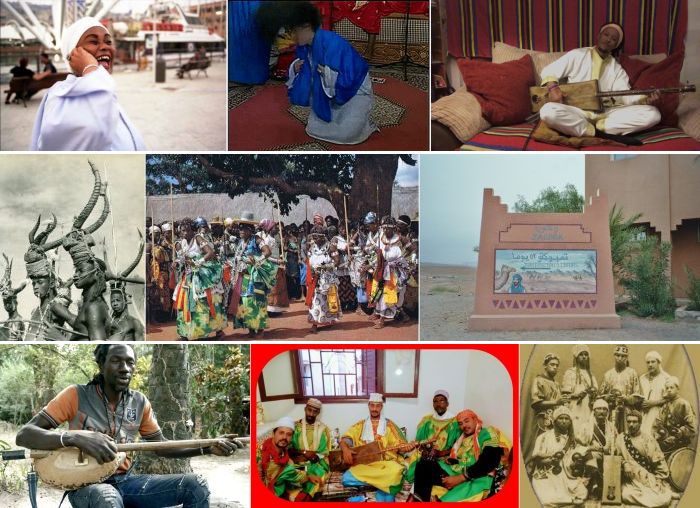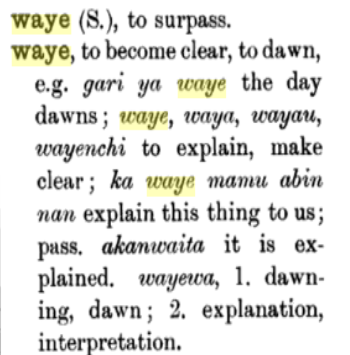

Welcome to Gnawa, night music from
Black Muslim Morocco
(lila, from the Arabic word 'lail').
The sacred, last night of Ramadan has come to us.
This holy month in Islam is centered around
the initial new moon's crescent:
why Muslim nations worldwide have the
moon and stars in their flags.
Maalem Smail is among many Gnawa
who participate, and we're happy
to bring you another song!
Fasting lasts from hours before dawn to sunset.
Such dedication makes one focus daily
on attaining a spiritual awareness, appreciating
what the Creator has given in this way.
Suhur is served in the morning (Hausa followers call it safur or this too).
Everyone hopefully has a meal (iftar) at night!
Jilala, played by Mounir
Gnawi of Sale
Gnawa commune over a long-awaited feast and likely play nubat
which they may have saved till Ramadan's conclusion.
Though Aicha Hamzaoui (Asmaa's sister) said that "in Morocco, listening
to Gnawa during Ramadan is common.
This music is typically played during iftar
in family homes and restaurants", so it depends.
"In our concerts we chant the name of Allah,
Prophet Muhammad (pbuh) and nature." (Al Araby)
This is Innov Gnawa with a gorgeous
rendition of the Shahada here.
Gnawa's history has a multi-migrational past like
a winding Saharan road: through Dahomey (Benin),
Katsina (Hausa community in
Nigeria today), Salaga
(northern Ghana near Dagomba Road),
Senegal (Mandinke) and the Western Sudan
(Essaouira) toward Algeria, Morocco.
Libya and Tunisia call Gnawa the bori
cult from roots in Hausa areas
with animist beliefs beyond Islam
Orders like the Komo society were sorcerors and carpenters:
wood-workers, hunters, instrument makers.
Jelis, hunters' musicians, invoked Islamic prayers
while retaining old African ways (Mande Music).
The Bamana ngoni or Mande koni,
kora, balams in Wolof
territory are all considered jeli instruments!
There are 100 or so Gnawa songs,
and maalems much like jelis
play them for minutes...or hours.
Jelis honor specific people while
drummers (like Gnawa of Ganga)
play particular rhythms for groups of people:
from other tribes to farmers.
They lived alongside North African communities
who settled in Kumbi Saleh,
Kumasi, Wangara, etc.
Scholars like Muhammad al-Maghili
of Tlemcen lived in Kano
for years until travelling throughout
the Songhay, Bouala, Ashantee
(North African Muslim Scholars and Their Influence...)
Explore the historical diffusion in my playlist.
Bouhala is a beautiful Gnawa song today,
but this connection means that Kufan
Kanawa ('the city of Black Kano')
and Zinder are a major ancestral community.
Gnawa of Sidi Bilal came later during the timeline,
through Sidi Mohammed Ben Abdellah,
Ismail and more (Essaouira).
Older Gnawa groups of Ganga were enslaved in
the Al-Mansur era on desert plantations.
All Gnawis consider Bilal to be their patron saint,
the first muezzin or Muslim who made
adhan, an Islamic call to prayer.
This special, spiritual relationship with song
plus Central-East African blood calls to the Gnawa
who were displaced and redefined home by finding God...
plus ancestral spirits along their way.
This is the gurmi in Hausaland.

Dictionary
of the Hausa Language, pg. 399
Gnawa music became a diasporic mixture
like its people and Northern Africa,
the overall continent.
So fusion or non-Moroccan genres are heard often
from Gnawi masters, players around the world.
Maalems like Si Mohamed Chaouqi made Jimi a better player,
and vice versa. We reach out and embrace one another.
You've heard Nass el Ghiwane, right?
They are not Gnawa since ghiwane is a secular folk style,
but Abderrahmane Kirouche (Maalem Paco) comes from an
Essaouira family of Gnawis.
Morocco's most popular band had true Gnawa at its core:
the national sound despite years of secrecy.
Monde Spirituelle Gnaoui sounds
like 1990's Moroccan Gnawa.
There is a primarily West African musicality in sync with North African sounds.
Fellow Marsaoui master Mahmoud Guinia
bridges an amazing, unique place in Gnawa:
real from heritage to tourka, ritual knowledge.
He created music with Egyptian and French artists,
African-American jazz legends like Pharoah Sanders,
Daby Toure, Karim Ziad and so many more.
Muluk el Hwa was an underrated Gnawa
group that preceded Nass Marrakech.
Abdeljalil Kodssi flowed into Muluk after
a '70's revival in Gnawa fusion.
Hassan Baska also is a key part of the underrated Marrakchi style.
The difference between Muluk
el Hwa and Nass Marrakech
is an audible transition through Gnawa, changing eras.
I heard Gnawa this way at a Maghrebi bazaar as a child
and then during my teenage years:
reaching for deeper meaning,
observing other faiths than Christianity, watching anime.
Cowboy Bebop: The Movie released in 2001.
The series documents a centuries-long
journey through outer
space in the late 2000's.
Moroccans have reached Mars by 2071.
Spike Spiegel is a bounty hunter on a mission
to find an ex-chemist, Rachid.
Rachid actually finds him and Gnawa plays.
Yoko Kanno composed a multicultural soundtrack
for a thought-provoking movie.
Her unspoken declaration, 'Gnawa is Morocco,
and welcome' changed my life.
Thank you, Gnawa friends, family and listeners in Africa.
You are the reason this will never be forgotten.
GNAWA LIVE STREAM I (![]() )
GNAWA LIVE STREAM II (
)
GNAWA LIVE STREAM II (![]() )
GNAWA LIVE STREAM III (
)
GNAWA LIVE STREAM III (![]() ) GNAWA LIVE STREAM IV
(
) GNAWA LIVE STREAM IV
(![]() )
GNAWA LIVE STREAM V (
)
GNAWA LIVE STREAM V (![]() )
GNAWA LIVE STREAM VI (
)
GNAWA LIVE STREAM VI (![]() )
GNAWA LIVE STREAM VII (
)
GNAWA LIVE STREAM VII (![]() )
GNAWA LIVE STREAM VIII
(
)
GNAWA LIVE STREAM VIII
(![]() )
)